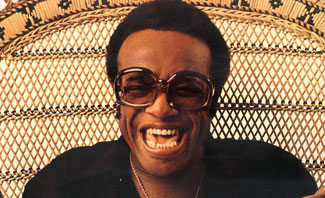 “As long as I’ve got that breath and my God-given talent, every time someone thinks of soul music, they’ll remember me and say, ‘That’s one motherf*cker who wouldn’t die.'”
“As long as I’ve got that breath and my God-given talent, every time someone thinks of soul music, they’ll remember me and say, ‘That’s one motherf*cker who wouldn’t die.'”
– Bobby Womack
NEW YORK (RUSHPRNEWS)AUGUST 9, 2008–Since he began his musical career as a child in the early 1950s, Bobby Womack has been one of American music’s true innovators, blending the styles of traditional gospel and soul with funk and R&B as an architect of the modern soul genre. Capitol/EMI honors Womack’s legendary body of work with the release of The Best Of Bobby Womack: The Soul Years, a new label-spanning CD and digital collection of his greatest soul sides from the 1960s and ’70s.
In the early 1950s, Bobby Womack began his music career as a member of The Womack Brothers, a gospel quintet with his siblings. In 1953, they opened for The Soul Stirrers and Womack befriended that group’s leader, Sam Cooke. Cooke signed the brothers to his own SAR record label, and renamed them The Valentinos in the early ’60s, a change that was accompanied by a crossover push into R&B from the group’s gospel roots. 1962’s “Lookin’ For A Love” was their first R&B hit (the song was later covered by the J. Geils Band and was their first pop hit), and The Valentinos hit the road with James Brown. Within weeks of its release, The Valentinos’ 1964 hit “It’s All Over Now” was covered by The Rolling Stones, becoming the band’s first #1 UK single and a 10-week resident on Billboard’s Hot 100 chart in the U.S., propelling Womack’s crossover fame.
The December 1964 murder of Womack’s mentor, Sam Cooke, was one of many hardships he would face during his life. A few months after Cooke’s death, Womack married his widow, Barbara Campbell; after several years of building his reputation, the then 21-year-old found himself cast out of and shunned by music’s inner circle.
Womack had toured with Cooke as a guitarist in his band, so after some failed solo efforts and largely untouched single releases with The Valentinos in the mid ’60s, he joined Ray Charles’ band as a guitarist and recorded as a session player for Aretha Franklin (1968, Aretha Now and Lady Soul), Joe Tex, Elvis Presley (1969, #1 hit “Suspicious Minds”) and others. He wrote several songs for Wilson Pickett during the next few years, including two Top 10 hits which he also recorded himself – “I’m In Love” and “I’m A Midnight Mover” – an association that would help to restore Womack’s standing in the closely-knit soul music community.
1968 marked the beginning of Womack’s comeback, when he released his first solo chart hit, “What Is This?,” followed by covers of “Fly Me To The Moon (In Other Words),” “California Dreamin’,” and “I Left My Heart In San Francisco.” In 1971, his “That’s The Way I Feel About Cha” from his Communication album reached #2 on the R&B chart, and he also played guitar on Sly & The Family Stone’s There’s A Riot Goin’ On, Rita Coolidge’s self-titled album, and Janis Joplin’s Pearl, among others.
In 1972, his “Woman’s Gotta Have It” hit the top of the chart as his first #1 R&B smash (later covered by James Taylor). “Harry Hippie,” also released that year, reached the Top 10, and Womack wrote the original music to the blaxsploitation film Across 110th Street, including the title song, later featured in Quentin Tarantino’s Jackie Brown in 1997 and in 2007’s American Gangster).
In 1973, Womack scored another Top 10 R&B hit with “Nobody Wants You When You’re Down and Out,” and the following year he re-recorded The Valentinos’ “Lookin’ For A Love,” which hit #1 on the R&B chart and the Pop chart’s Top 10. The Top 5 R&B single “You’re Welcome, Stop On By” followed.
Womack’s career was flying high, but trouble wouldn’t stay away for long. In 1974, Womack’s brother Harry (the inspiration for Womack’s 1972 hit “Harry Hippie”) was murdered in Bobby’s apartment. Womack leaned heavily on drugs and alcohol to try to dull the pain of losing his brother. It was a choice that would, despite Womack’s two 1975 Top 10s, “Check It Out” and Daylight,” eventually derail his career from the fast track yet again for several years. In the early ’80s he came back from the sidelines and has released several albums since then, including a gospel album in 1999 that brought his career full circle, back to where it all began for The Womack Brothers.
Still recording and performing at the age of 64, Bobby Womack is a true soul survivor, a musical torchbearer of life’s trials and hardships. “I’m still writing music,” says the music legend. “It’s impossible to always rise to the occasion, but it’s important that when the spirit has you, you work with it. That’s when you have something to say – not because you’re under pressure to prove to somebody that you’re still here and valid.”
NEWS SOURCE:URBAN NETWORK



